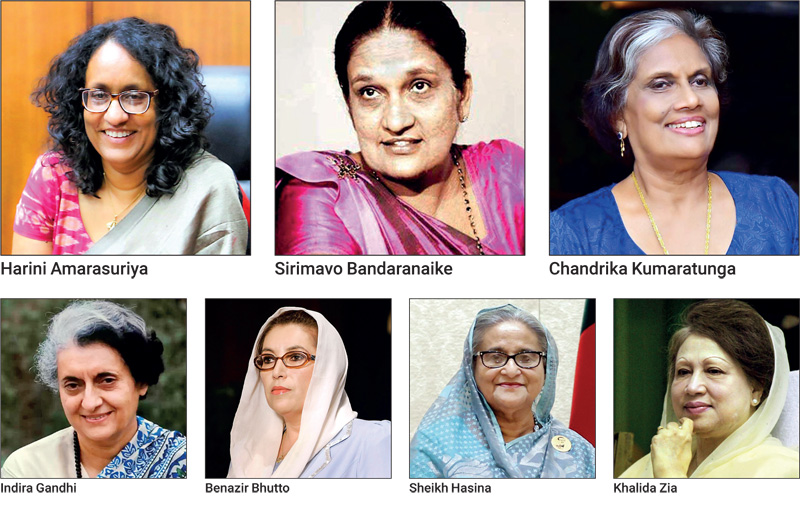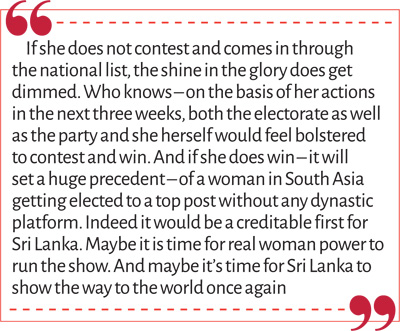Monday Feb 16, 2026
Monday Feb 16, 2026
Tuesday, 8 October 2024 00:29 - - {{hitsCtrl.values.hits}}

 South Asia is no stranger to women holding top positions of political power. Sri Lanka led the way with Sirimavo Bandaranaike being the world’s first ever woman Prime Minister. She took on the mantle (party leader SLFP) vacated by her husband S.W.R.D. Bandaranaike who was assassinated in 1959. She ran for elections in 1960 and won and later on again in 1970 she took on the role of PM. Her daughter Chandrika Kumaratunga too became PM from August to November 1994 and was later on President of Sri Lanka from 1994-2005.
South Asia is no stranger to women holding top positions of political power. Sri Lanka led the way with Sirimavo Bandaranaike being the world’s first ever woman Prime Minister. She took on the mantle (party leader SLFP) vacated by her husband S.W.R.D. Bandaranaike who was assassinated in 1959. She ran for elections in 1960 and won and later on again in 1970 she took on the role of PM. Her daughter Chandrika Kumaratunga too became PM from August to November 1994 and was later on President of Sri Lanka from 1994-2005.
Sri Lanka has many women who played crucial roles in shaping its history. Queen Anula was supposed to have been the first ever female head of state in Asia. And supposedly ruled Sri Lanka from 47 BC to 42 BC. Another notable queen was Viharamahadevi, whose son Dutugemunu is famous for being one of the first kings of Sri Lanka to unite the north and the south of the island. History refers to the role of Viharamahadevi in inspiring Dutugemunu to make this happen.
In modern times too Sri Lankan women play important roles – in the family – as preserver of culture and fostering community but also as a bread earner. With 56% of population being female, Sri Lankan women play crucial roles in even key forex earning industries – garments and tea and tourism. Besides they also constitute a large number of housemaids who travel to the Middle East and send back much needed forex back to their homes and families in Sri Lanka.
The rest of South Asia too have followed Sri Lanka and had strong and enduring women leaders at the helm of political power. In India, Indira Gandhi – daughter of first PM – Jawaharlal Nehru. In Pakistan – Benazir Bhutto – daughter of Zulfikar Ali Bhutto. In Bangladesh – Sheikh Hasina – daughter of Mujibur Rehman (freedom fighter and president of Bangladesh) and Khalida Zia, wife of Ziaur Rehman (President). So it’s safe to say that South Asia has many glorious examples for women holding positions of political power at the very top.
Power came from family backgrounds
But equally one could argue that while political power in these hands may have been eventually legitimised by the ballot, the original opportunity for the women in power in South Asia came from their family backgrounds. Each one had either fathers or husbands in power. And thus had readymade platforms and significant exposure needed to succeed in the rough and tumble world of politics. Whether it was Sirimavo or Chandrika or Indira or Benazir or Hasina or Khaleda it’s their Bandaranaike, Nehru, Bhutto, Sheikh or Zia advantage that served as a ready platform for their launch to the helm.
This was true right now until September 2024. Till when Harini Amarasuriya was appointed as PM of Sri Lanka by the President Anura Kumara Dissanayake – AKD (who won the Presidential election) as part of his caretaker cabinet. This post will be held by Harini Amarasuriya till the conduct of the general elections due on 14 November 2024.
Harini Amarasuriya is known as an academic (a PhD), an activist (liberal – left of Centre – active on issues related to gender development, child protection, youth affairs). She has been in parliament as an MP since 2020 (on the national list). Her background is unusual for a politician in that she is educated in a top ladies school in Colombo (Bishops College) and even pursued her further education in sociology in the renowned Hindu College in New Delhi. She did her PhD in social anthropology from Edinburgh University. She has published books and done extensive research on matters she has actively propagated. And has been a lecturer in the Open University of Sri Lanka in the subject of sociology. It’s not often that a well-known woman activist and academic with such high quality education and credentials becomes a Prime Minister in a South Asian country.
But then, it’s not often that a left leaning group formed with a combination of civil activists and others wrest power from the entrenched political establishment in Sri Lanka. This happened in the September 2024 Presidential election In Sri Lanka.
To understand the emergence of Harini Amarasuriya in this vanguard position in politics in Sri Lanka one needs to also understand the reason why her party the NPP and its leader AKD won the 2024 Presidential election.
 Turning point in history
Turning point in history
Many people see the Aragalaya (the struggle) waged by the common people of Sri Lanka in May 2022 as a turning point in its history. Angered by the incompetent management of its economy and disillusioned (as they saw it) by the corrupt regime in power they came out in large numbers to overthrow the previous Government. While the then president Gotabaya Rajapaksa relinquished power, the writ of the family continued (since they had maximum MPs in parliament). The first opportunity the people had to express their anger in a ballot was in September 2024, when they voted in AKD as President.
It was a clear vote for a complete change of guard and an expected change of ethos from the old political culture of cronyism and favour. AKD previously had won only 3% votes in a Presidential election. In the September 2024 election he secured 42% votes signalling the mood of the nation in entrusting the role of leader to a completely untested leader. And an untested party NPP, a large part of which is the JVP considered to be an extreme left wing Marxist party in the past.
By appointing Harini Amarasuriya as PM, the NPP and AKD have signalled its intent to change the political culture and bring in people with experience and qualifications at the political helm. It also serves another purpose – to allay the fears of the large number of anxious voters who did not vote for the NPP – believing that it is but a mask of the JVP (which has had a militant past). The party realises that unless they have a parliamentary majority in the ensuing elections the AKD presidency could be hampered in its execution of policy. And hope that that placing Harini at the helm can sway the non-believers in urban areas to vote for the NPP.
Harini Amarasuriya is at the moment only the PM in a caretaker government, in a presidential form of government. But for both, Sri Lanka and for South Asia it’s a matter of great pride that a woman who has been actively involved in serving families and communities on the ground and one who has the education and vision to develop Sri Lanka has been given such an onerous post.
It speaks volumes for the highly complex democratic processes at work in Sri Lanka. It is not only the oldest democracy in South Asia but proving itself to be one of the most evolved one too.
First among equals
Harini Amarasuriya is certainly the first among equals in terms of woman political leaders in South Asia. The ensuing general election will reveal if she can seal her position by winning at the polls and setting an incredible new precedent – a woman leader voted in by the people purely on the merit of her own capabilities and without the family surname representing political dynasty.
The choice to contest is hers and the party’s. If she does not contest and comes in through the national list, the shine in the glory does get dimmed. Who knows – on the basis of her actions in the next three weeks, both the electorate as well as the party and she herself would feel bolstered to contest and win.
And if she does win – it will set a huge precedent – of a woman in South Asia getting elected to a top post without any dynastic platform.
Indeed it would be a creditable first for Sri Lanka.
Maybe it is time for real woman power to run the show. And maybe it’s time for Sri Lanka to show the way to the world once again.
(The writer is an Indian businessman living in Sri Lanka. He is a keen observer of politics and economics in the country. And he can be reached on [email protected].)